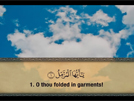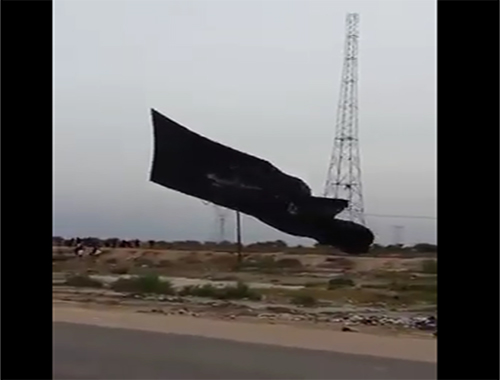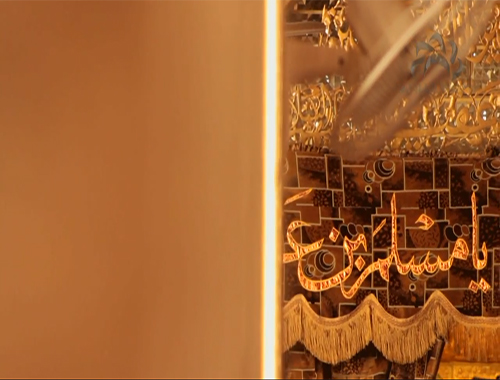The Neighbor's Rights in the Life
- Details
- Hits: 3749
The Neighbor’s Rights in the Life and Traditions of the Prophet(p.b.u.h.)
Satisfying the Needs of the Neighbors and the Poor
One of the moral and humane duties towards the neighbors is to help them with their problems and satisfy their needs. Such acts bring about success in this world and the world to come, if done in the intention of to Allah. Therefore, the Holy Prophet (p.b.u.h.) is reported to have stated:
من قضى لمؤمن حاجة قضى الله له حوائج كثيرة أدناهن الجنة
“Anyone who satisfies the need of a Muslim, Allah will satisfy many of his needs, the least of which is (to let him enter) Paradise.”
The Holy Prophet (p.b.u.h.) also commands us to keep company with the poor:
جالِسُوا الفُقراء
because our company familiarizes us with their problems, allows us to understand the needs of the deprived class of society and helps us remove their complications and hardships. Abu Dharr al-Ghifari, son of the desert, lived in a poor tribe. In addition to prayer, fighting the bullies, criticizing the usurping rulers and propagating Islamic teachings, he would care for the poor neighbors and give a considerable amount of milk to his underprivileged neighbors after milking his sheep.
The Holy Prophet (p.b.u.h.) states:
من طلب الدنيا استغناءً عن الناس و تعطّفاً على الجار لقي الله و وجهه كالقمر ليلة البدر
“Whoever seeks this world (through lawful means) in order to be in no need of people and be kind to the neighbours, he will meet Allah while his face is like the moon (when it is full).”
He also says:
ما آمن بي من بات شبعان و جاره جائع
“He who spends the night satisfied while his neighbour is hungry does not have faith in me.” Similarly, he is reported to have said:
لايشبع المؤمن دون جاره
“A faithful one shall not eat his fill while his neighbour feels hungry.”
Concerning The Night (92), one of the Meccan surahs, all the exegetes and the books on the occasions of revelation thus remark:
A man had a palm tree some of whose branches were inclined towards his neighbor’s house, who was a poor man with some little children. When he climbed up his palm to pick up the dates, some of the dates would fall in the poor man’s house. Stingy and hard-hearted, the man would come down the tree and take back the dates that the poor man’s children were picking them up. He would even put his fingers into their mouths to bring dates out if the children had put some in their mouths!
The poor man complained about the stingy man’s conduct to the Holy Prophet (p.b.u.h.), so the Prophet said: “Go. I will make inquiries into your problem!” Thereupon, he visited the owner of the palm tree, and said to him: “Are you willing to give me your palm tree, whose branches are bending towards your poor neighbor’s house and, in return, I guarantee to give you a palm tree in heaven?” The stingy man replied: “This is the most fruitful tree amongst my palms and I am not willing to enter into such a deal”, so he left the Holy Prophet (p.b.u.h.). Another man who was among the followers thus said: “Will I be granted such a tree in heaven if I get the palm tree and give it you?” The Holy Prophet (p.b.u.h.) said: “Definitely”. He went to the owner of the palm tree and after insisting a lot, he managed to buy it in return for 40 palm trees. Thereafter, he went to the Holy Prophet (p.b.u.h.) and said: “I have bought the tree and now I give it to you.” The Holy Prophet (p.b.u.h.) went to the poor man’s house and said to him: “The tree which is inclined towards your house will be yours then.” The poor man was very glad. At this moment the 92nd surah of the Holy Qur’an, The Night, was revealed, the 5th to 7th verses being about the man who gave the Holy Prophet (p.b.u.h.) the tree.
فَأَمَّا مَن أَعْطَى وَاتَّقَى * وَصَدَّقَ بِالْحُسْنَى * فَسَنُيَسِّرُهُ لِلْيُسْرَى
“As for him, who gives in charity, fears Allah and testifies to goodness, we shall facilitate for him the easy way.”
As regards the verses 8 to 11, they criticize the stingy man who was not willing to sell the Holy Prophet (p.b.u.h.) the tree:
ا مَن بَخِلَ وَاسْتَغْنَى * وَكَذَّبَ بِالْحُسْنَى * فَسَنُيَسِّرُهُ لِلْعُسْرَى * وَمَا يُغْنِي عَنْهُ مَالُهُ إِذَا تَرَدَّى
“As for him who is a stingy and considers himself independent of Allah and rejects the goodness, we shall facilitate for him the hard way. Just think! What
benefit will he get from his wealth, if he himself is doomed?.”
In the 7th verse of The Aid (l07) we the read:
ويمنعون الماعون(ie but deny aid). Aid (al-ma‘un) refers to all small things which neighbors borrow to satisfy their needs. In al-Durr al-Manthur, it has been reported that Imam ‘Ali (p.b.u.h.) thus stated:
سمعت رسول الله يقول: المسلم اخوالمسلم، اذا لقيه حياه بالسلام، و يرد عليه ما هو خير منه، لا يمنع الماعون
“I heard the Holy Prophet (p.b.u.h.) said: “The Muslim is a brother to the Muslim. When he meets him, he greets him with a salute and greets him with a better one than it. He shall not deny him the kindness (al-ma‘un).”
قلت: يا رسول الله، ما الماعون؟
“I asked: O Messenger of Allah! What is meant by al-ma‘un?” He thus answered:
قال: الحجر و الحديد و الماء و أشباه ذلك
“A stone, iron, water and the like.”
In another tradition the Holy Prophet (p.b.u.h.) has interpreted iron as copper pots and stone as stone containers.
The Holy Prophet (p.b.u.h.) is also reported to have said:
من منع الماعون جاره منعه الله خيره يوم القيامة، و وكله نفسه، فما اسوأ حاله
“He who denies his neighbor the kindness and assistance, Allah will deny him His blessing on the Day of Resurrection and leaves him alone; how unfortunate is he!”
Ill-mannered Neighbors
The last Messenger of Allah (p.b.u.h.) counts the bad neighbor as one of the evil omens of a house. In another tradition he regards the bad neighbor as a true example of wickedness.
Similarly, he is reported to have said:
ثلاثةٌ هنّ امّ الفواتر
“Three things are backbreaking”:
سلطان ان احسنت اليه لم يشكر و ان اسأت اليه لم يغفر، و جار عينه ترعاك و قلبه يغناك، ان رأي حسنة دفنها و لم يفشها و ان رأي سيئة اظهرها و اذاعها، و زوجة ان شهدت لم تقر عينك بها و ان غبت لم تطمئن اليها
1- An authority figure who does not extend thanks when you do an act of kindness to him, and who does not forgive you when you do him wrong.
2- A neighbor who keeps an eye on you and is waiting for your death, if he sees an act of your proper conduct he conceals it and will not inform anyone about it, but if you do something inappropriate he will make it known and spreads it (to everyone).
3- A wife who does not delight you when you are present and whom you cannot trust while you are absent.
An ill-mannered and evil-minded neighbor separates himself from Allah’s blessings as stated by the Holy Prophet Muhammad (p.b.u.h.):
اثنان لا ينظر الله اليها يوم القيامة: قاطع الرحم و جارالسوء
“There are two ones at whom Allah shall not look on the Day of Judgment: one who severs the bonds of kinship and an ill-mannered neighbor.”
The Prophet (p.b.u.h.) has also emphasized:
لا يؤمن عبد حتى يأمن جاره بوائقه
“A servant (of Allah) does not have faith (in Him) unless his neighbor feels secure about his inconveniences.”
In another report, Prophet Muhammad (p.b.u.h.) has also warned:
من آذى جاره حرّم الله عليه ريح الجنة و مأواه جهنم و بئس المصير و من ضيّع حق جاره فليس منّا
“He who causes trouble to his neighbor, Allah will deprive him of the smell of paradise and he will be doomed to hell which is a terrible place, and he who ignores his neighbor’s right is not one of us.”
Similarly, the Holy Apostle of Allah (p.b.u.h.) is reported to have said: “One of the signs and characteristics of a true believer is that he does not cause trouble to his neighbor and his neighbors are not bothered by their nearness to his house.”
Once a companion of the Holy Prophet (p.b.u.h.) said to him: “A woman may always fast during the day, night in prayer and give charity, but she bothers her neighbor.” The Holy Prophet (p.b.u.h.) replied: “there is no good in her action.” They said: “A woman may only perform her duties, including prayer, fasting … etc, but she does not bother her neighbor.” He thus responded: “This woman is of the people of Paradise.”
Those who cause trouble to their neighbors have a dreadful place in the world to come; therefore the Holy Prophet (p.b.u.h.) depicts their miserable destiny thus:
من خان جاره شبراً من الارض جعلها الله طوقا في عنقه من تخوم الارضين السابعة حتى يلقى الله يوم القيامة مطوقاً الا ان يتوب و يرجع
“He who betrays his neighbor in the same measure as a span of land, Allah shall make it a circle around his neck from the seventh layer of the earth until he meets Allah encircled unless he turns to Allah in repentance and stops (doing wrong to his neighbor).”
One of the Prophet’s (p.b.u.h.) companions had a bad-tempered and an ill-mannered neighbor. He therefore could not bear his neighbor’s countless inconveniences and decided to talk to the Holy Prophet (p.b.u.h.) about his behavior. The Holy Prophet (p.b.u.h.) recommended him to correct his neighbor’s bad behavior through kindness and tolerance. He did as the Prophet (p.b.u.h.) had recommended him to do. However, the arrogant neighbor kept on causing trouble to him and increased his evil acts. Thereupon, he went to the Prophet (p.b.u.h.) again and told him about his great effort, explaining that living in that house was no longer possible for him anymore; and it was also difficult to move to another house, so he would stay away from the mosque and be deprived of Bilal’s call to prayer. Appreciating the trouble of the Muslim companion, the Holy Prophet told him to take his furniture out and put it in the way of people.
The companion did and put his furniture in the alley. The passers-by gathered around him and asked him about what had caused such a problem. He opened his mouth and complained about the inconveniences and pressures caused by his neighbor. When Muslims listened to his tragic story, they cursed, reprimanded, blamed the neighbor and said: “O Allah, curse him and make him homeless!”
When the transgressing neighbor realized that people were cursing and criticizing his conduct, and his neighbor took shelter in the alley because of his disturbance, he rushed to him, kissed his face and apologized to him. At first the annoyed neighbor did not pay any attention to him until he started to cry, and his cry was accompanied by tears so he felt pity for him and took his furniture within. Peace and friendship dominated their lives, kindness and affection attached their hearts to each other and no one heard any more complaint about each other and there was no animosity between them anymore.
Muslim jurisprudents have approved of this wise Prophetic order as a means to correct wrong behavior and judge between people; that is, it is permissible to fight against oppression with legal and logical strategies. This action counts as an instance of a wise strategy which forces an offender to quit his unpleasant act. For nothing is harder than social and public anger to accomplish such a goal, because it jeopardizes the position and rank of the offender.
Tolerance towards the Neighbors’ Disturbance
In Islamic sources showing tolerance towards the neighbors’ disturbance is considered one of the characteristics of a faithful human being and a good and well-mannered neighbor. In a tradition the Holy Prophet (p.b.u.h.) is reported to have said: “There are three people whom Allah loves and there are three people to whom Allah has an aversion... . The third is one who, although is bothered by his neighbor, bears this inconvenience until death, or travel separates them…”
When the Holy Prophet (p.b.u.h.) was living in Mecca, his neighbors used to treat him harshly. In his second sermon in Nahj al-Balaghah, Imam ‘Ali (p.b.u.h.) talks about the pre-Islamic period and thus:
في فتن داستهم بأخفافها و وطئتهم بأظلافها و قامت على سنابكها، فهم فيها تائهون حائرون جاهلون مفتونون في خير دار و شرّ جيران
“In trials which trampled the people under their hoofs, and trod upon them with their feet. The vices stood on their toes (in full stature), and the people immersed in them were strayed, perplexed, ignorant and seduced as though in a good house with bad neighbors.”
After the Holy Prophet’s Mission (p.b.u.h.) and his persistence, people increasingly joined him and the nobles of Mecca who lived in his neighborhood got frightened. Abu Jahl, one of the ill-mannered neighbors of the Prophet (p.b.u.h.), addressed the opponents of the Prophet (p.b.u.h.), saying: “There is no use in breaking the bones of our neighbor anymore. If you ask me, we must bother him so much so that he gets weary and leaves us.” They said: “what should we do?” “When Muhammad passes the alley, we will pour ash on his head from the roofs”, he replied.
The man who carried out this plan was called ‘Amir, one of wicked people of the neighborhood. One day when the last Messenger of Allah (p.b.u.h.) was passing the alley, he poured a lot of ash on his head. At the same time, the enemies of the Prophet (p.b.u.h.) started laughing at him and reading awful poems about him. Then they waited for his reaction, and surprisingly saw that the Prophet (p.b.u.h.) removed the ash calmly and looked kindly at the people around him.
This act was repeated in the following days, and each time they saw the Holy Prophet’s patience, tolerance and kindness. One day while passing the ally, our Holy Prophet (p.b.u.h.) noticed that no ash was poured down and asked a young man: “Where is the man who poured ash on my head everyday? how is he?” He answered: “If you mean ‘Amir, he has fallen sick.” The Holy Prophet (p.b.u.h.) went to visit him and inquired about his health and prayed for his healing. The heavy burden of shame and guilt caused more trouble to ‘Amir than his illness, but he had a new feeling and felt that he did not hate his neighbor anymore and started to love him. Bursting into tears and introducing Abu Jahl as the stimulator of his bad action, he removed the blanket and addressed the Prophet thus (p.b.u.h.): “I want to be a Muslim, am I worthy of it?”
The merciful Prophet replied: “Definitely.” At that moment the neighbor who used to the inconvenience the best man in the world embraced Islam and pledged to defend it and the Prophet (p.b.u.h.) through out the rest of his life, fighting the enemies of Islam and Qur’an.
Abu Lahab (the Prophet’s uncle) was among the neighbors from whose disturbance the Holy Prophet (p.b.u.h.) was not safe.
Umm Jalil, Abu Lahab’s wife, used to gather a lot of bushes from the desert and put them in the way of the Holy Prophet (p.b.u.h.), saying to her husband: “We cause trouble to this neighbor so as to please you.” At that moment they would hear the voice of the Holy Prophet (p.b.u.h.) saying: “Should the neighbors behave like this?”
However, Umm Jalil seemed satisfied to have annoyed her neighbor. The troubles of these neighbors were such that concerning Abu Lahab the Qur’an thus states:
تَبَّتْ يَدَا أَبِي لَهَبٍ وَتَبَّ
“Perish the hands of Abu Lahab, and perish he.”
Umm Jalil got what she deserved and Abu Lahab died of depression after Muslims won the Battle of Badr. In this war the Holy Prophet (p.b.u.h.) stood over the well in which the dead bodies of the idolaters were thrown and thus remarked:
هل وجدتم وعد ربكم حقاً فاني قد وجدت ما وعدني ربي حقاً بئس القوم كنتم لنبيكم ... و اخرجتموني ... و قاتلتموني...
“Did you find what your lord promised you to be true? I have verily found what my Lord promised me to be true.
How terrible neighbors were you for the Apostle of Allah. You expelled him from his home in Mecca and fought him.”
After the capture of Mecca, the Holy Prophet (p.b.u.h.) gave amnesty to his neighbors although they were awful neighbors , denied his Prophethood, and separated him from his family by means of pressure , disturbance, negative propagation and increasing threats. Even when he moved to Medina, they fought him and his companions .
After moving to Medina, the Holy Prophet (p.b.u.h.) entered the house of Abu Ayyub al-Ansari (who was one of the good and poor people of that city) and become his neighbor in his two-story building. Abu Ayyub did his best to respect the Majesty of the Holy Prophet (p.b.u.h.) and treated him well as a neighbor and was proud to see that the Prophet (p.b.u.h.) considered him worthy of being his friend.
‘Abd Allah ibn Mas‘ud also took pride in being a neighbor of the Holy Prophet (p.b.u.h.) and blessed by this nearness, he got a high station in the exegesis of Qur’an.
But in Medina there were also neighbors who used to inconvenience the Prophet (p.b.u.h.) as stated by the Holy Qur’an:
لَئِن لَّمْ يَنتَهِ الْمُنَافِقُونَ وَالَّذِينَ فِي قُلُوبِهِم مَّرَضٌ وَالْمُرْجِفُونَ فِي الْمَدِينَةِ لَنُغْرِيَنَّكَ بِهِمْ ثُمَّ لَا يُجَاوِرُونَكَ فِيهَا إِلَّا قَلِيلاً
“If the hypocrites and those in whose hearts is malice and the scandal mongers of Medina do not desist, We shall rouse you against them, then they will not be your neighbors in it except for a little while.”
Therefore, the Holy Prophet (p.b.u.h.) is reported to have said:
مازلت انا و من كان قبلي من النبيين و المؤمنين مبتلين بمن يؤذينا
“I and the prophets as well as the believers before me have always suffered from those who cause trouble to us.”











